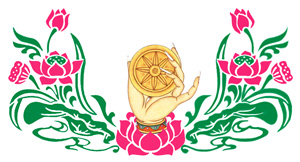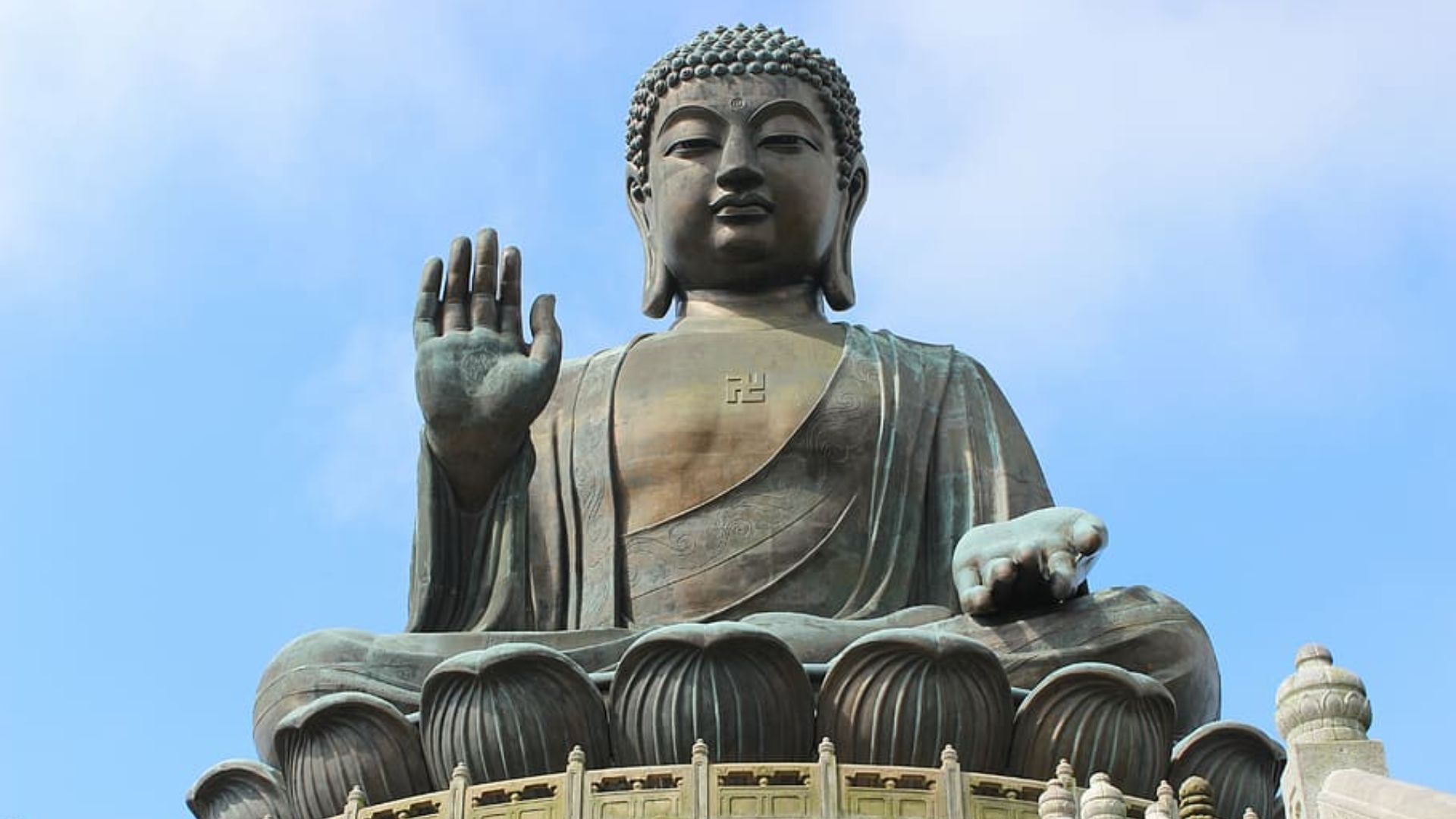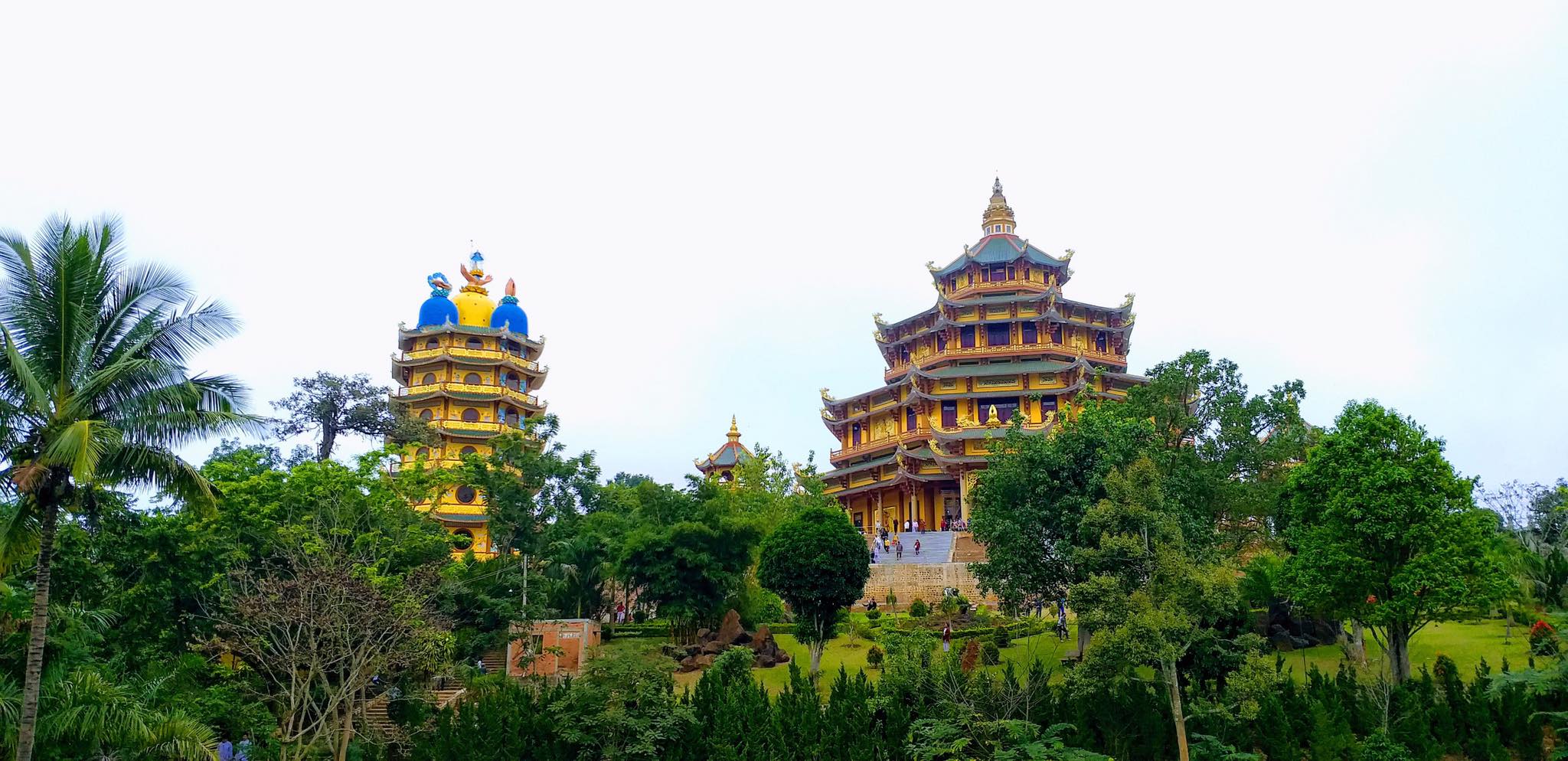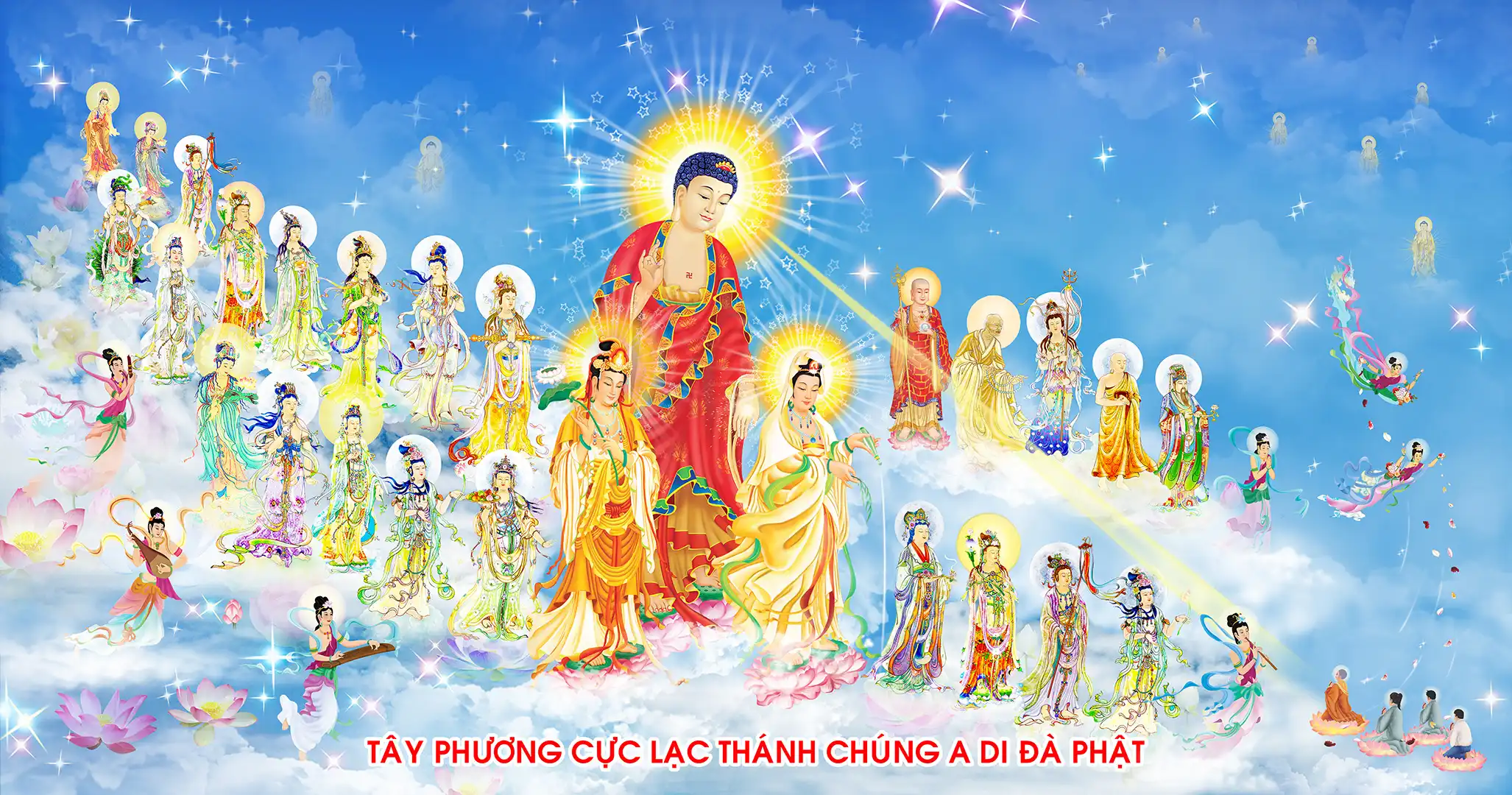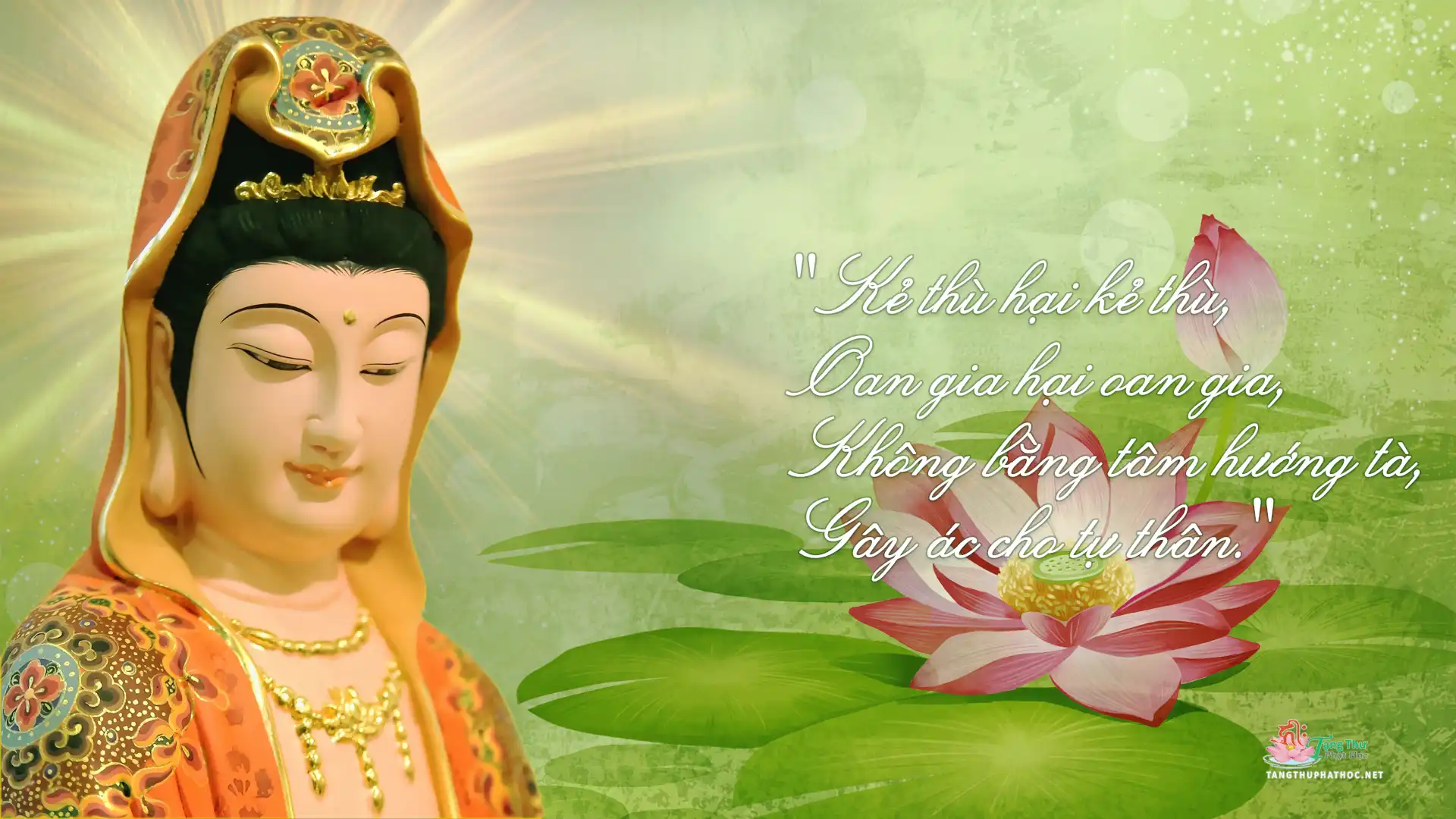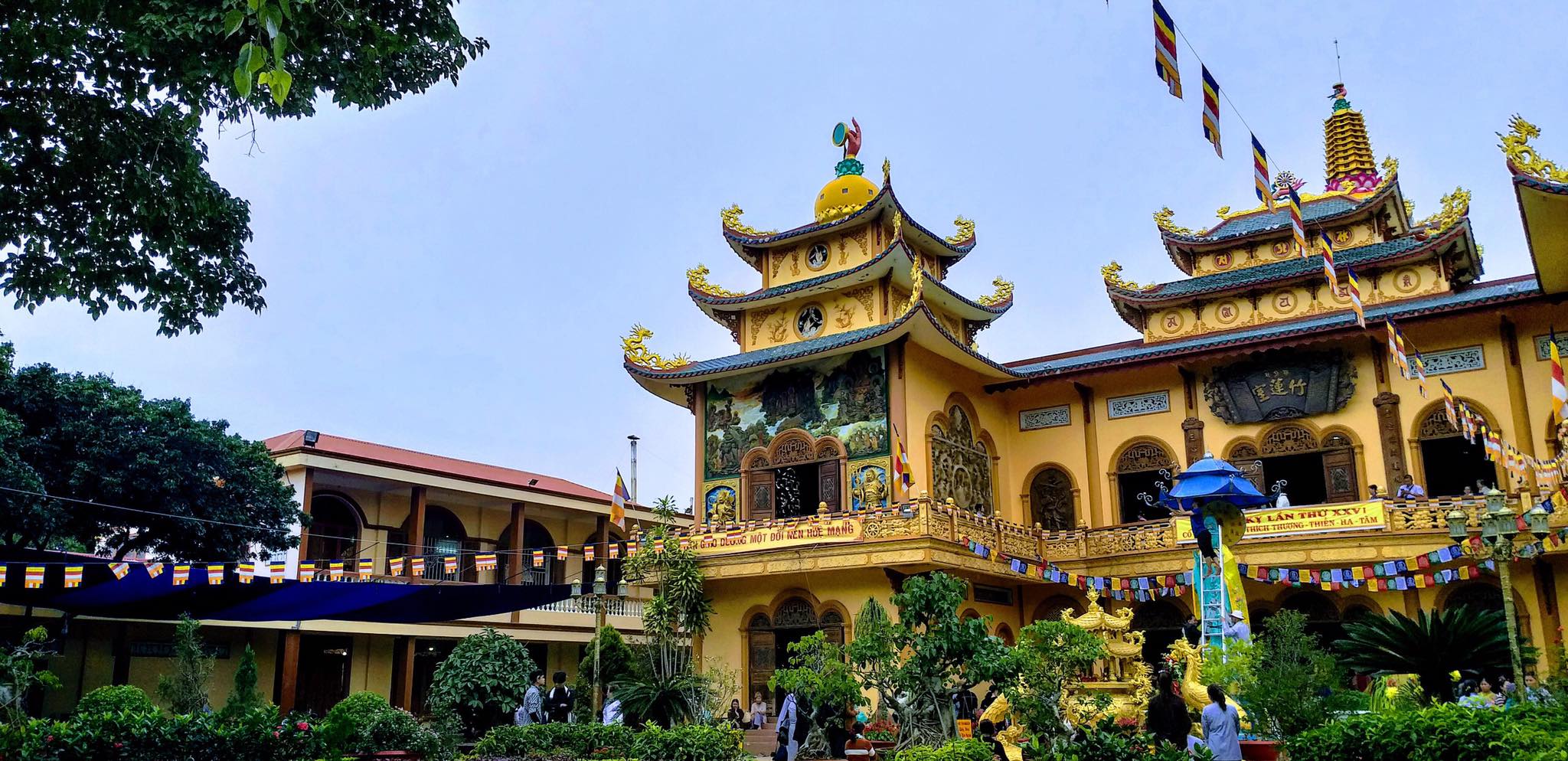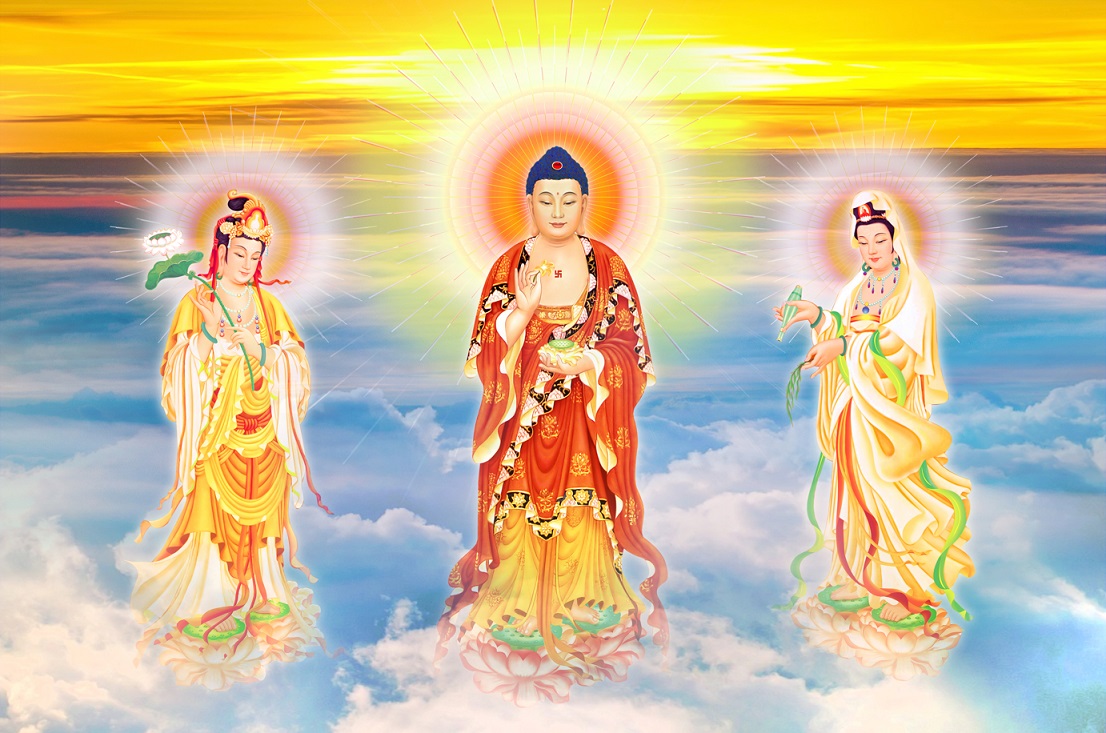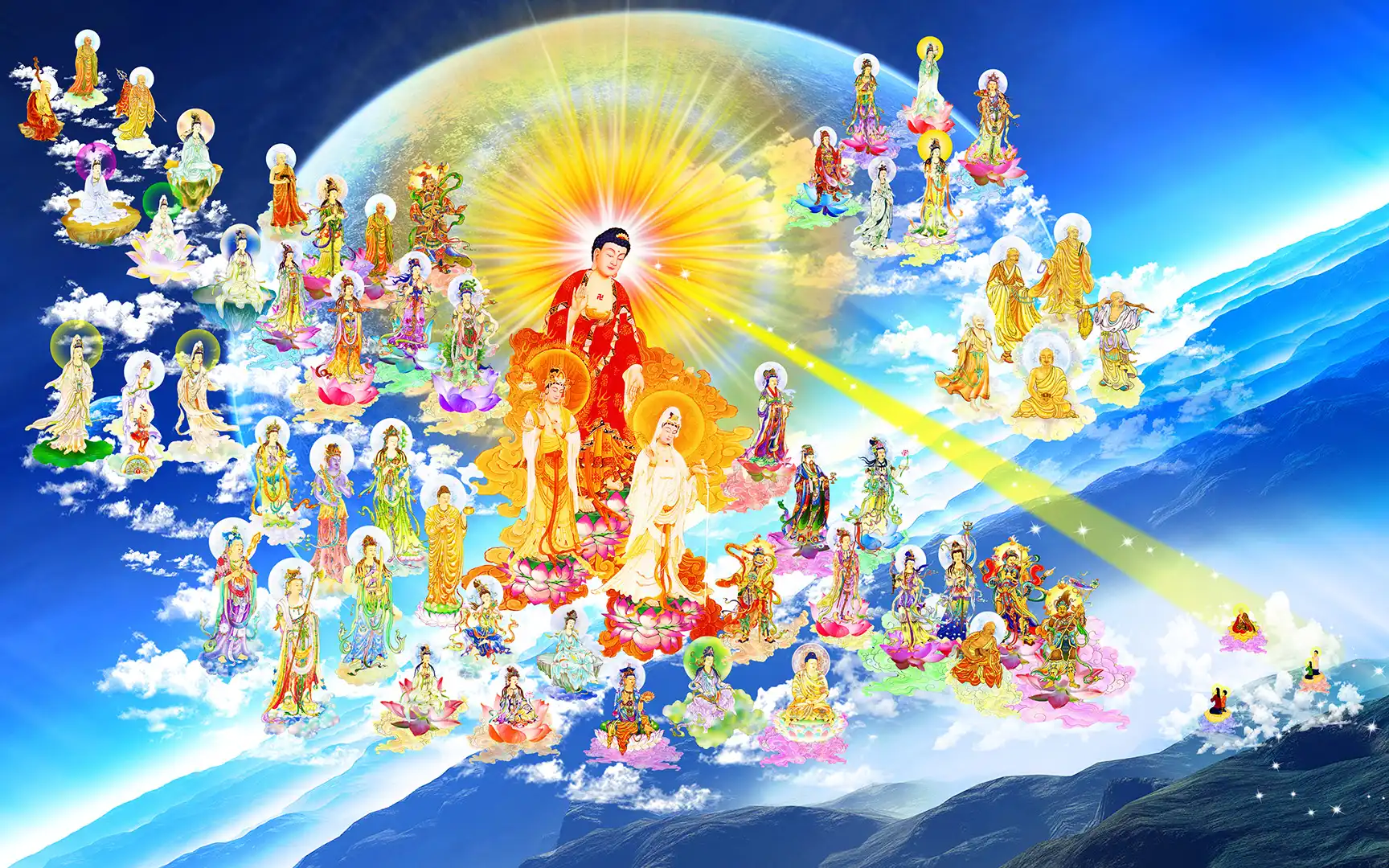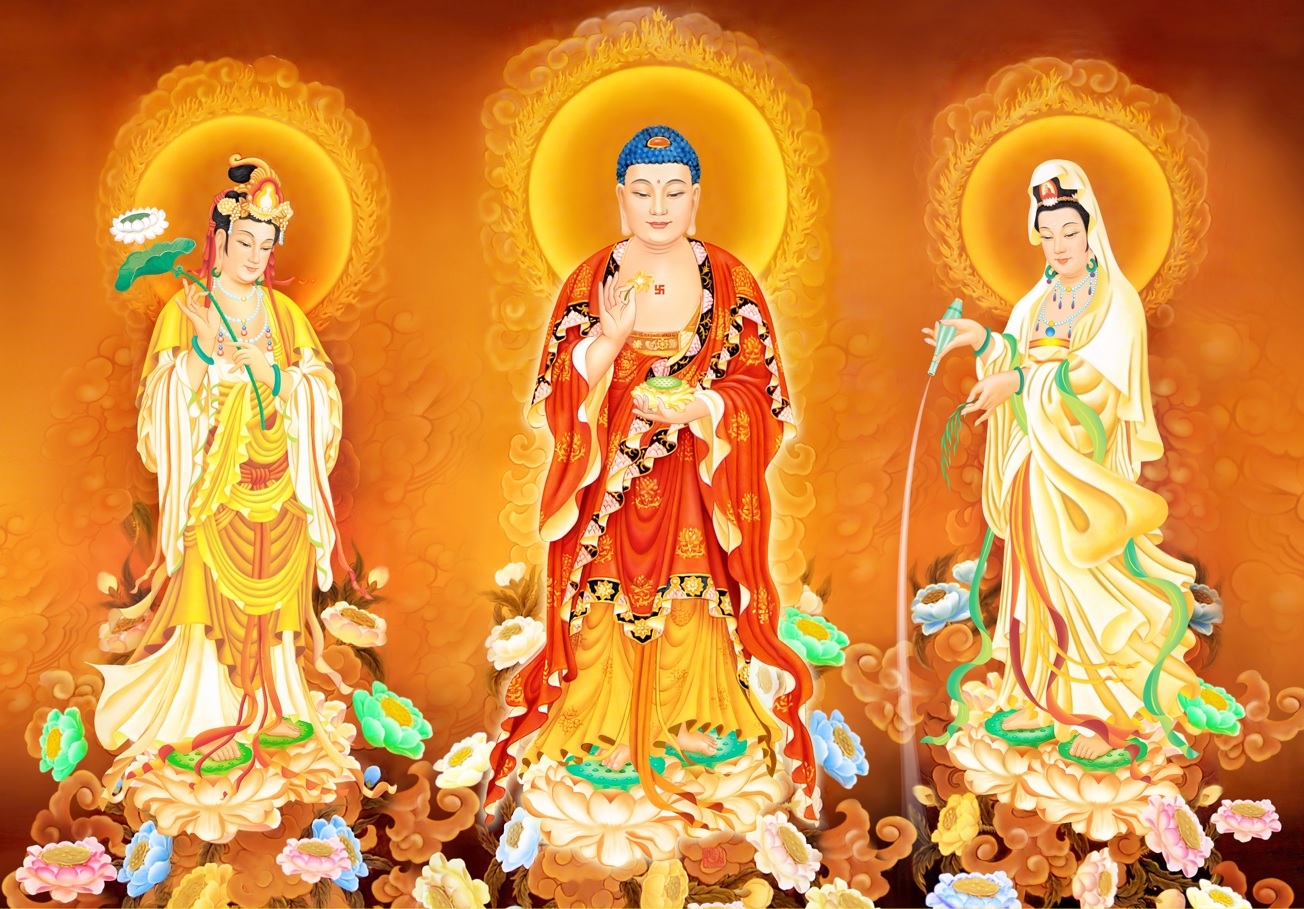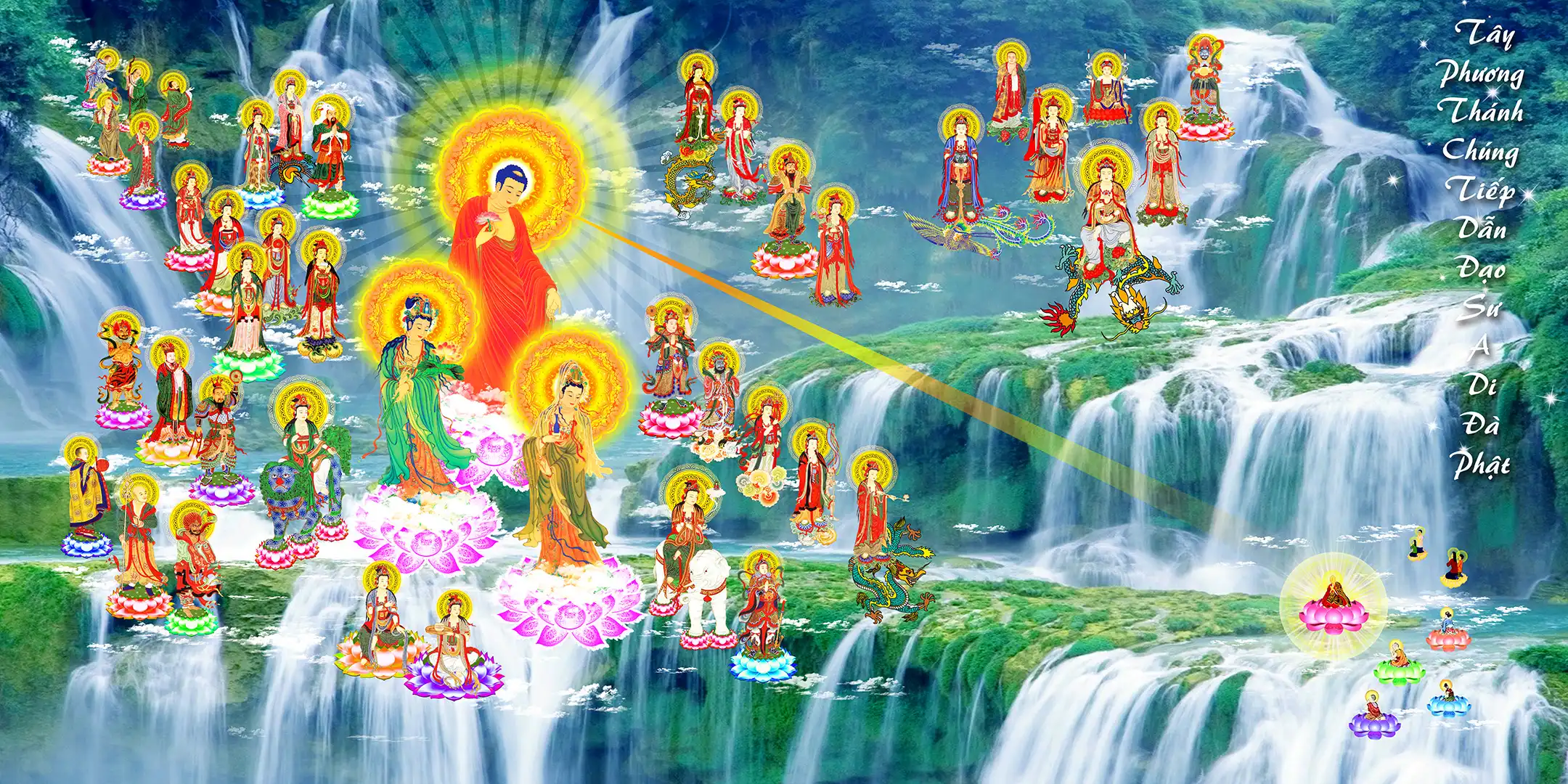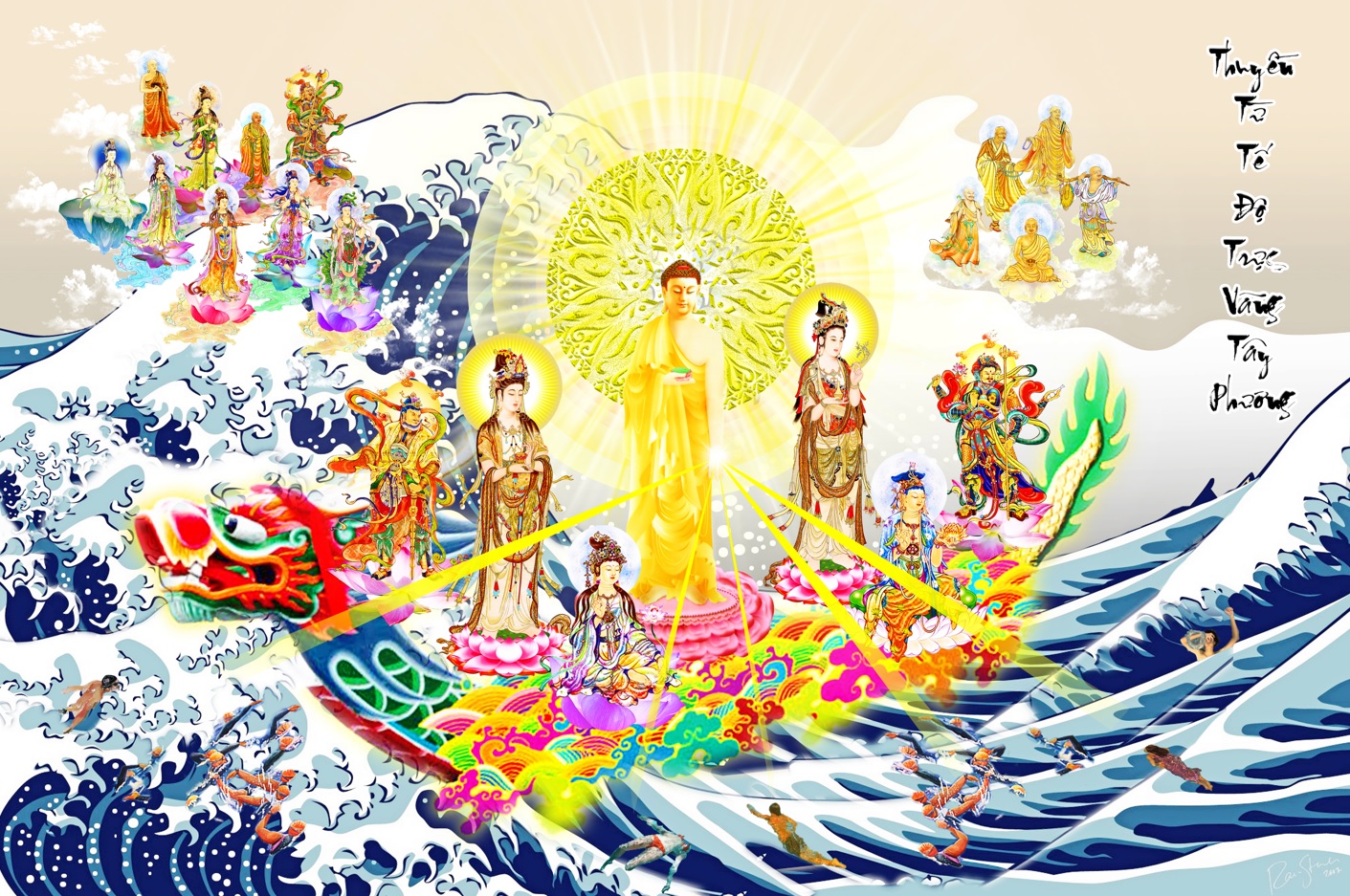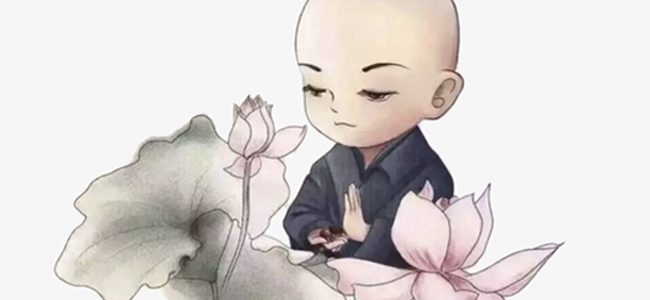Tổ Đình Minh Đăng Quang
PHẬT HỌC TỪ ĐIỂN – BUDDHIST DICTIONARY
Thiện Phúc
PHỤ LỤC (APPENDICES)
PHỤ LỤC F – Appendix F
Kinh Pháp Bảo Ðàn
The Jewel Platform Sutra
Phẩm Thứ Tám—Ðốn Tiệm—The Eighth Chapter—Sudden And Gradual
Khi ấy Tổ ở chùa Bảo Lâm tại Tào Khê, còn Thần Tú Ðại Sư ở chùa Ngọc Tuyền tại Kinh Nam. Bấy giờ hai Tông thạnh hóa, người đương thời đều gọi là Nam Năng Bắc Tú nên có hai tông Nam Bắc, chia ra đốn tiệm, mà người học không biết tông thú. Tổ bảo chúng rằng: “Pháp vốn một tông, người có Nam Bắc, pháp tức là một thứ, thấy có mau và có chậm. Sao gọi là đốn tiệm? Pháp không có đốn tiệm, người có lợi căn, độn căn, nên gọi là đốn tiệm.” Nhưng đồ đệ của ngài Thần Tú thường chê Tổ sư Nam Tông là không biết một chữ, có cái gì hay. Thần Tú nói rằng: “Tổ Huệ Năng được trí vô sư, thâm ngộ được pháp thượng thừa, tôi không bằng vậy. Vả lại Thầy tôi là Ngũ Tổ, chính Ngài truyền y pháp, há lại suông ư? Tôi hận không có thể đi xa để mà thân cận, luống thọ ân Quốc Vương, vậy những người các ông không nên kẹt ở đây, nên đến Tào Khê tham hỏi.” Một hôm Thần Tú sai đệ tử là Chí Thành rằng: “Ông thông minh nhiều trí, nên vì tôi mà đến Tào Khê nghe pháp, nếu nghe được điều gì, hết lòng ghi lấy, trở về nói cho tôi nghe.”—While the Patriarch was staying at Pao-Lin Temple in Ts’ao-His, the Great Master Shen Hsiu was at Yu Ch’uan Temple in Ching-Nan. At that time the two schools flourished and everyone called them, ‘Southern Neng and Northern Hsiu.’ So it was that the two schools, northern and southern, were divided into ‘Sudden’ and ‘Gradual.’ As the students did not understand the doctrine, the Master said to them, “The Dharma is originally of one school. It is people who think of North and South. The Dharma is of one kind, but people understand it slowly or quickly. Dharma is not sudden or gradual, rather it is people who are sharp or dull. Hence the terms sudden and gradual.” Nonetheless, Shen-Hsiu’s followers continually ridiculed the southern Patriarch, saying that he couldn’t read a single word and had nothing in his favor. But Shen Hsiu said, “He has obtained wisdom without the aid of a teacher and understands the Supreme Vehicle deeply. I am inferior to him. Furthermore, my Master, the Fifth Patriarch, personally transmitted the robe and Dharma to him and not without good reason. I regret that I am unable to make the long journey to visit him, as I unworthily receive state patronage here. But do not let me stop you. Go to Ts’ao-Hsi and call on him.” One day Shen Hsiu told his disciple Chih-Ch’eng, “You are intelligent and very wise. You may go to Ts’ao-Hsi on my behalf and listen to the Dharma. Remember it all and take careful notes to read to me when you return.”
Chí Thành vâng mệnh đến Tào Khê, theo chúng tham thỉnh, không nói từ đâu đến. Khi ấy Lục Tổ bảo chúng rằng: “Ngày nay có người trộm pháp đang ẩn trong hội nầy.” Chí Thành liền ra lễ bái và thưa đầy đủ việc của ông. Tổ bảo: “Ông từ Ngọc Tuyền lại nên là kẻ do thám.”—As ordered, Chih-Ch’eng proceeded to Ts’ao-Hsi and joined the assembly without saying where he had come from. The Patriarch told the assembly, “Today there is a Dharma thief hidden in this assembly.” Chih-Ch’eng immediately stepped forward, bowed and explained his mission. The Master said, “You are from Yu-Ch’uan; you must be a spy.”
Chí Thành đáp: “Không phải.”—“No,” he replied, “I am not.”
Tổ hỏi: “Sao được không phải?”—The Master said, “What do you mean?”
Chí Thành thưa: “Chưa nói là phải, đã thưa rồi là không phải.”—He replied, “Before I confessed, I was; but now that I have confessed, I am not.”
Tổ bảo: “Thầy ông dùng cái gì chỉ dạy chúng?”—The Master said, “How does your Master instruct his followers?”
Chí Thành thưa: “Thường chỉ dạy đại chúng trụ tâm quán tịnh, thường ngồi chẳng nằm.”—Chih-Ch’eng replied, “He always instructs us to dwell with the mind contemplating stillness and to sit up all the time without lying down.”
Tổ bảo: “Trụ tâm quán tịnh là bệnh chớ không phải thiền, thường ngồi là câu chấp nơi thân, đối với lý có lợi ích gì?” Hãy lắng nghe bài kệ của tôi đây:
“Khi sống ngồi không nằm,
Khi chết nằm không ngồi,
Vốn là đầu xương thúi,
Vì sao lập công khóa.”
The Master said, “To dwell with the mind contemplating stillness is sickness, not Dhyana. Constant sitting restrains the body. How can it be beneficial? Listen to my verse:
When living, sit, don’t lie.
When dead, lie down, don’t sit.
How can a set of stinking bones
Be used for training?”
Chí Thành lễ bái thưa rằng: “Ðệ tử ở chỗ đại sư Thần Tú, học đạo chín năm mà không được khế ngộ. Ngày nay nghe Hòa Thượng nói một bài kệ liền khế ngộ được bổn tâm. Sanh tử là việc lớn, đệ tử xin Hòa Thượng vì lòng đại bi chỉ dạy thêm.” Tổ bảo: “Tôi nghe thầy ông dạy học nhơn pháp giới định huệ, hành tướng như thế nào, ông vì tôi nói xem?”—Chih-Ch’eng bowed again and said, “Your disciple studied the way for nine years at the place of great Master Hsiu but obtained no enlightenment. Now, hearing one speech from the High Master, I am united with my original mind. Your disciple’s birth and death is a serious matter. Will the High Master be compassionate enough to instruct me further?” The Master said, “I have heard that your Master instructs his students in the dharmas of morality, concentration, and wisdom. Please tell me how he defines the terms.”
Chí Thành thưa: “Ðại sư Thần Tú nói các điều ác chớ làm gọi là giới, các điều thiện vâng làm gọi là huệ, tự tịnh ý mình gọi là định, chưa biết Hòa Thượng lấy pháp gì dạy người?”—Chih-Ch’eng said, “The great Master Shen-Hsiu says that morality is abstaining from doing evil, wisdom is offering up all good conduct, and concentration is purifying one’s own mind. This is how he explains them, but I do not know, High Master, what dharma of instruction you use.”
Tổ bảo: “Nếu tôi nói có pháp cho người tức là nói dối, ông chỉ tùy phương mở trói, giả danh là tam muội. Như thầy ông nói giới định huệ, thật là không thể nghĩ bàn, nhưng chỗ thấy giới định huệ của tôi lại khác.”—The Master said, “If I said that I had a dharma to give to others, I would be lying to you. I merely use expedients to untie bonds and falsely call that samadhi. Your master’s explanation of morality, concentration, and wisdom is truly inconceivably good but my conception of morality, concentration and wisdom is different from his.”
Chí Thành thưa: “Giới định huệ chỉ là một thứ vì sao lại có khác?”—Chih-Ch’eng said, “There can only be one kind of morality, concentration, and wisdom. How can there be a difference?”
Tổ bảo: “Thầy ông nói giới định huệ là tiếp người Ðại thừa, còn tôi nói giới định huệ là tiếp người tối thượng thừa, ngộ hiểu chẳng đồng, thấy có mau chậm; ông nghe tôi nói cùng với kia đồng hay chăng? Tôi nói pháp chẳng lìa tự tánh, lìa thể nói pháp thì gọi là nói tướng, tự tánh thường mê, phải biết tất cả muôn pháp đều từ nơi tự tánh khởi dụng, ấy là pháp chơn giới, chơn định, chơn huệ.” Hãy lắng nghe tôi nói kệ đây:
“Ðất tâm không lỗi tự tánh giới,
Ðất tâm không si tự tánh huệ,
Ðất tâm không loạn tự tánh định.
Chẳng tăng chẳng giảm tự kim cang,
Thân đến thân đi vốn tam muội.”
The Master said, “Your master’s morality, concentration, and wisdom guide those of the Great Vehicle, whereas my morality, concentration, and wisdom guide those of the Supreme Vehicle. Enlightenment is not the same as understanding; seeing may take place slowly or quickly. Listen to my explanation. Is it the same as Shen-Hsiu’s? The Dharma which I speak does not depart from the self-nature, for to depart from the self-nature in explaining the Dharma is to speak of marks and continually confuse the self-nature. You should know that the functions of the ten thousand dharmas all arise from the self-nature and that this is the true morality, concentration, and wisdom. Listen to my verse:
Mind-ground without wrong:
Self-nature morality.
Mind-ground without delusion:
Self-nature wisdom.
Mind-ground without confusion:
Self-nature concentration.
Neither increasing nor decreasing:
You are vajra.
Body comes, body goes:
The original samadhi.”
Chí Thành nghe kệ rồi hối tạ, mới trình một bài kệ:
“Năm uẩn thân huyễn hóa,
Huyễn làm sao cứu cánh,
Xoay lại tìm chân như,
Pháp trở thành bất tịnh.”
Hearing this verse, Chih-Ch’eng regretted his former mistakes and he expressed his gratitude by saying this verse:
These five heaps are
A body of illusion.
And what is illusion?
Ultimately?
If you tend toward
True suchness
The Dharma is
Not yet pure.
Tổ liền ấn khả đó, lại bảo Chí Thành rằng: “Giới định huệ của Thầy ông là khuyên dạy người tiểu căn tiểu trí, còn giới định huệ của tôi đây là dạy người đại căn đại trí. Nếu ngộ được tự tánh cũng chẳng lập Bồ Ðề, Niết Bàn, cũng chẳng lập giải thoát tri kiến, không một pháp có thể được mới hay dựng lập muôn pháp. Nếu hiểu được ý nầy cũng gọi là thân Phật, cũng gọi là Bồ Ðề Niết Bàn, cũng gọi là giải thoát tri kiến. Người thấy tánh lập cũng được, không lập cũng được, đi lại tự do, không bị trệ ngại, ứng dụng tùy việc làm, nói năng tùy đáp, khắp hiện hóa thân, chẳng lìa tự tánh, liền được tự tại thần thông, du hý tam muội, ấy gọi là kiến tánh.”—The Master approved, and he said further to Chih-Ch’eng, “Your Master’s morality, concentration and wisdom exhort those of lesser faculties and lesser wisdom, while my morality, concentration, and wisdom exhort those of great faculties and great wisdom. If you are enlightened to your self-nature, you do not set up in your mind the notion of Bodhi or of Nirvana or of the liberation of knowledge and vision. When not a single dharma is established in the mind, then the ten thousand dharmas can be established there. To understand this principle is to achieve the Buddha’s body which is also called Bodhi, Nirvana, and the liberation of knowledge and vision as well. Those who see their own nature can establish dharmas in their minds or not establish them as they choose. They come and go freely, without impediments or obstacles. They function correctly and speak appropriately, seeing all transformation bodies as intregral with the self-nature. That is precisely the way they obtain independence, spiritual powers and the samadhi of playfulness. This is what is called seeing the nature.”
Chí Thành lại thưa: “Thế nào là nghĩa chẳng lập?”—Chih Ch’eng asked the Master further, “What is meant by ‘not establishing?’”
Tổ bảo: “Tự tánh không lỗi, không si, không loạn, niệm niệm Bát Nhã quán chiếu, thường lìa pháp tướng, tự do tự tại, dọc ngang trọn được, có gì nên lập? Tự tánh tự ngộ, đốn ngộ, đốn tu cũng không thứ lớp, cho nên chẳng lập tất cả pháp. Các pháp là lặng lẽ, có thứ lớp gì?”—The Master replied, “When your self-nature is free from error, obstruction and confusion when Prajna is present in every thought, contemplating and shedding illumination and when you are constantly apart from the dharma marks and are free and independent, both horizontally and vertically, then what is there to be established? In the self-nature, in self-enlightenment, in sudden enlightenment, and in sudden cultivation there are no degrees. Therefore, not a single dharma is established. All dharmas are still and extinct. How can there be stages?”
Chí Thành liền lễ bái, nguyện làm người hầu hạ, sớm chiều không lười mõi. Chí Thành là người Thái Hòa Cát Châu—Chih-Ch’eng made obeisance and attended on the Master day and night without laziness. He was a native of T’ai Ho in Chi Chou.
Bhikshu Chih-Ch’e
Tăng Chí Triệt, quê ở Giang Tây, họ Trương tên Hành Xương, thuở nhỏ là một hiệp khách. Từ khi chia ra hai tông Nam Bắc, hai vị Tông chủ tuy quên bỉ ngã, nhưng đồ chúng tranh nhau khởi yêu ghét. Khi ấy đệ tử của Bắc Tông tự lập Ngài Thần Tú làm Tổ thứ sáu, mà kỵ vì Lục Tổ được truyền y, mọi người đều nghe nên mới dạy Hành Xương đến ám sát Lục Tổ. Tổ tâm thông dự biết việc ấy nên liền để mười lạng vàng ở dưới tòa. Khi ấy ban đêm Hành Xương vào trong thất Tổ, toan muốn hại Tổ, Tổ đưa cổ cho chém, Hành Xương liền hươi kiếm ba lần, thảy đều không thương tổn. Tổ bảo: “Kiếm chánh chẳng tà, kiếm tà chẳng chánh, chỉ nợ vàng của ông.” Hành Xương hoảng hốt té xỉu, giây lâu mới tỉnh, cầu xin sám hối, liền nguyện xuất gia. Tổ liền cho vàng bảo: “Ông hãy đi, e đồ chúng trở lại hại ông, một ngày khác ông có thể thay hình đổi dạng mà trở lại, tôi sẽ nhận ông.” Hành Xương vâng lời dạy, giữa đêm trốn đi, sau theo Tăng xuất gia, thọ giới cụ túc, tinh cần tu hành. Một hôm ông nhớ lại lời Tổ, từ xa đến lễ ra mắt Tổ. Tổ bảo: “Tôi nhớ ông đã lâu, sao ông đến muộn vậy?”—Bhikshu Chih-Ch’e, a native of Chiang Hsi, had the family name Chang and the personal name Hsing-Ch’ang. As a youth, he was an itinerant warrior. When the schools split into the Northern and Southern, although the two leaders had lost the notion of self and other, the disciples stirred up love and hate. The disciples of the Northern School secretly set up Shen-Hsiu as the Sixth Patriarch. Fearing that the country would hear of the transmission of the robe, they hired Hsing-Ch’ang to assassinate the Master. But the Master had the power of knowing the thoughts of others. He knew of this matter in advance and set ten ounces of gold in his chair. That night, Hsing-Ch’ang entered his room intending to kill him. The Master stretched out his neck. Hsing-Ch’ang swung the blade three times but could not harm him. The Master said, “A straight sword is not bent, a bent sword is not straight, I merely owe you gold, I do not owe you life.” Hsing-Ch’ang fell to the ground in fright. After a while he came to and begged for mercy, repenting of his error and vowing to leave home. The Master gave him the gold and said, “Go. I fear that my followers will come and take revenge. Change your appearance and return another day and I will accept you.” Hsing Ch’ang received his orders and disappeared into the night. Later, he left home under another Bhikshu, received complete precepts and was vigorous in practice. One day, remembering the Master’s words, he made the long journey to have an audience. The Master said, “I have thought of you for a long time. What took you so long?”
Hành Xương thưa: “Trước nhờ ơn Hòa Thượng xá tội, ngày nay tuy xuất gia khổ hạnh, trọn khó đền đáp ân đức, đâu mong truyền pháp độ sanh ư? Ðệ tử thường xem kinh Niết Bàn, chưa hiểu nghĩa thường và vô thường, cúi xin Hòa Thượng từ bi chỉ dạy.”—He replied, “The High Master once favored me by pardoning my crime. Although I have left home and although I practice austerities, I shall never be able to repay his kindness. May I try to repay you by transmitting the Dharma and taking living beings across? Your disciple often studies the Mahaparinirvana Sutra, but he has not yet understood the principles of permanence and impermanence. I beg the High Master to be compassionate and explain them for me.”
Tổ bảo: “Vô thường tức là Phật tánh, hữu thường tức là tâm phân biệt tất cả pháp thiện ác vậy.”—The Master said, “Impermanence is just the Buddha nature and permanence is just the mind discriminating good and evil dharmas.”
Hành Xương thưa rằng: “Hòa Thượng nói pháp rất trái với văn kinh.”— Hsing-Ch’ang replied, “High Master, your explanation contradicts the Sutra text!”
Tổ bảo: “Ta được truyền tâm ấn của Phật, đâu dám trái với kinh Phật.”—The Master said, “I transmit the Buddha’s mind-seal. How could I dare to contradict the Buddhas’ Sutras?”
Hành Xương thưa: “Kinh nói Phật tánh là thường, Hòa Thượng lại nói là vô thường, các pháp thiện ác cho đến tâm Bồ Ðề đều là vô thường mà Hòa Thượng lại nói là hữu thường, đây tức là trái nhau, khiến cho học nhơn càng thêm nghi ngờ.”—Hsing-Ch’ang replied, “The Sutra says that the Buddha nature is permanent and the High Master has just said that it is impermanent; it says that good and evil dharmas, reaching even to the Bodhi Mind, are impermanent and the High Master has just said that they are permanent. This contradiction has merely intensified your student’s doubt and delusion.”
Tổ nói: “Kinh Niết Bàn thuở xưa tôi có nghe Ni Vô Tận Tạng đọc một lần liền vì bà giảng nói, không có một chữ, một nghĩa nào không hiệp với văn kinh, cho đến vì ông nói cũng trọn không có hai thuyết.”— The Master said, “Formerly, I heard Bhikshuni Wu Chin Tsang recite the Nirvana Sutra. When I comented on it, there was not one word or principle which did not accord with the sutra text. My explanation to you now is not different.”
Hành Xương thưa: “Học nhơn thức lượng cạn tối, cúi mong Hòa Thượng lượng theo mà từ bi khai thị.”—Hsing-Ch’ang replied, “Your student’s capacity for understanding is superficial. Will the High Master please explain further?”
Tổ bảo: “Ông biết chăng, Phật tánh nếu thường lại nói gì là các pháp thiện ác, cho đến cùng kiếp không có một người phát tâm Bồ Ðề, nên tôi nói là vô thường, mà chính là đạo chơn thường của Phật nói. Lại tất cả pháp nếu là vô thường, tức là mỗi vật đều có tự tánh, dung thọ sanh tử mà tánh chơn thường có chỗ bất biến, nên tôi nói thường chính là Phật nói nghĩa chân vô thường. Phật xưa vì phàm phu ngoại đạo chấp tà thường, còn các hàng nhị thừa thường mà chấp là vô thường, cộng thành tám thứ điên đảo, nên trong giáo lý liễu nghĩa kinh Niết Bàn phá thiên kiến kia mà hiển bày chơn thường, chơn lạc, chơn ngã, chơn tịnh. Nay ông y theo lời nói mà trái với nghĩa, dùng đoạn diệt vô thường và xác định cái tử thường mà lầm hiểu lời nói mầu nhiệm viên diệu tối hậu của Phật, dù có xem một ngàn biến kinh thì có lợi ích gì?”—The Master said, “Don’t you understand? If the Buddha nature were permanent, what use would there be in speaking of good and evil dharmas? To the end of an aeon not one person would produce the Bodhi Mind. Therefore, I explain it as impermanent. That is exactly what the Buddha explained as the meaning of true permanence. Furthermore, if all dharmas were permanent, all things would have a self-nature subject to birth and death and the true permanent nature would not pervade all places. Therefore, I explain it as impermanent. That is exactly what the Buddha explained as the meaning of the true permanence. It was for the sake of common people and those who belong to other religions who cling to deviant views of permanence, and for all those who follow the two-vehicle way, mistaking permanence for impermanence formulating the eight perverted views, that the Buddha in the ultimate Nirvana teaching destroyed their prejudiced views. He explained true permanence, true bliss, true selfhood and true purity. You now contradict this meaning by relying on the words, taking annihilation to be impermanence and fixing on a lifeless permanence. In this way you misinterpret the last, subtle, complete and wonderful words of the Buddha. Even if you read it a thousand times, what benefit could you derive from it?”
Hành Xương bỗng nhiên đại ngộ, liền nói kệ rằng:
“Vì giữ tâm vô thường,
Phật nói có tánh thường,
Không biết được phương tiện,
Như ao xuân mò gạch,
Nay tôi chẳng thi công,
Mà Phật tánh hiện tiền,
Không phải thầy trao cho,
Tôi cũng không sở đắc.”
Hsing-Ch’ang suddenly achieved the great enlightenment and spoke this verse:
To those who hold impermanence in mind
The Buddha speaks of the permanent nature;
Not knowing expedients is like
Picking up pebbles from a spring pond.
But now without an effort
The Buddha nature manifests;
The Master did not transmit it,
And I did not obtain a thing.”
Tổ bảo: “Nay ông mới triệt vậy, nên đặt tên ông là Chí Triệt.” Chí Triệt lễ tạ mà lui—The Master said, “Now you understand! You should be called Chih-Ch’e (breadth of understanding).” Chih-Ch’e thanked the Master, bowed and withdrew.
Có một chú bé tên là Thần Hội ở Tương Dương, con nhà họ Cao, mười ba tuổi từ chùa Ngọc Tuyền đến tham lễ—A young boy thirteen years old named Shen-Hui, who was from a Kao family in Hsiang-Yang, came from Yu-Ch’uan to pay homage.
Tổ hỏi: “Tri thức từ xa nhọc nhằn đến lại đem được cái gốc đến chăng? Nếu có gốc thì nên biết được ông chủ, thử nói xem?”—The master said, “The Knowing One’s journey must have been difficult. Did you bring the original with you? If you have the original, you should know the owner. Try to explain it to me.”
Thần Hội thưa: “Lấy vô trụ làm gốc, thấy tức là chủ.”—Shen-Hui said, “I take non-dwelling as the original and seeing as the owner.”
Tổ bảo: Ông sa di nầy đâu nên nói như thế.”—The Master said, “This Sramanera imitates the talk of others.”
Thần Hội liền hỏi: “Hòa Thượng tọa thiền lại thấy hay chẳng thấy?”— Shen-Hui then asked, “When you sit in Ch’an, High Master, do you see or not?”
Tổ cầm gậy đánh ba gậy hỏi: “Tôi đánh ông đau hay chẳng đau?”—The Master hit him three times with his staff and said, “When I hit you, does it hurt or not?”
Thần Hội đáp: “Cũng đau cũng không đau.”—Shen-Hui replied, “It both hurts and does not hurt.”
Tổ bảo: “Tôi cũng thấy cũng chẳng thấy.”—The Master said, “I both see and do not see.”
Thần Hội hỏi: “Thế nào là cũng thấy cũng chẳng thấy?”—Shen-Hui asked, “How can you both see and not see?”
Tổ bảo: “Chỗ thấy của tôi thường thấy những lỗi lầm nơi tâm mình, không thấy phải quấy tốt xấu của người khác, ấy do cũng thấy mà cũng chẳng thấy. Ông nói đau cũng chẳng đau là thế nào?
Nếu ông chẳng đau thì đồng như cây đá, nếu ông đau thì đồng với phàm phu, tức khởi sân hận, ông hướng về trước thấy là hai bên, đau chẳng đau là sanh diệt, ông tự tánh lại chẳng thấy mà dám đùa với người.”—The Master said, “What I see is the transgression and error of my own mind. I do not see the right, wrong, good or bad of other people. This is my seeing and not seeing. How can you say it both hurts and does not hurt? If it does not hurt you are like a piece of stone but if it does hurt you are just like a common person and will give rise to hatred. Your ‘seeing and not seeing’ are two extreme and your ‘hurting and not hurting’ are production and extinction. You have not even seen your own nature and yet you dare to ridicule others.”
Thần Hội liền lễ bái sám hối. Tổ lại nói: “Tâm ông nếu mê chẳng thấy thì hỏi thiện tri thức để tìm đường, còn tâm ông nếu ngộ tức tự thấy tánh, y pháp tu hành, ông tự mê không thấy tâm mình, trở lại hỏi ta thấy cùng chẳng thấy. Ta thấy thì tự biết há thay cái mê cho ông, nếu ông tự thấy cũng chẳng thay được cái mê cho ta, sao chẳng tự biết tự thấy mà hỏi ta thấy cùng chẳng thấy.” Thần Hội lại lễ hơn một trăm lạy, xin sám hối tội lỗi rồi siêng năng hầu hạ bên cạnh không rời—Shen-Hui bowed, apologized and thanked the Master. The Master continued, “If your mind is confused and you do not see, then ask a Good Knowing Advisor to help you find the way. If your mind is enlightened, then see your own nature and cultivate according to the Dharma. You yourself are confused and do not see your own mind and, yet, you come to ask me whether or not I see. If I see, I know it for myself but is that of any help to you in your confusion? In the same way your seeing is of no use to me. Why don’t you know and see it for yourself, instead of asking me whether or not I see?” Shen-Hui bowed again over one hundred times, seeking forgiveness for his error. He served the Master with diligence, never leaving his side.
Một hôm Tổ bảo chúng: “Tôi có một vật không đầu, không đuôi, không danh, không tự, không lưng, không mặt, các người lại biết chăng?”—One day the Master addressed the assembly as follows: “I have a thing. It has no head or tail, no name or label, no back or front. Do you all know what it is?”
Thần Hội bước ra nói rằng: “Ấy là bổn nguyên của chư Phật, là Phật tánh của Thần Hội.”—Shen-Hui stepped forward and said, “It is the root source of all Buddhas, Shen-Hui’s Buddha nature!”
Tổ bảo: “Tôi đã nói với ông không danh không tự, ông liền gọi là bổn nguyên, là Phật tánh, ông nhằm đi lấy cỏ tranh che đầu, cũng chỉ thành cái hạng tông đồ của tri giải.”—The Master said, “I just told you that it has no name or label, and you immediately call it the root-source of all Buddhas. Go and build a thatched hut over your head! You’re nothing but a follower who pursues knowledge and interpretation.”
Sau khi Tổ diệt độ, ngài Thần Hội vào Kinh Lạc, hoằng truyền pháp đốn giáo Tào Khê, viết bộ Hiển Tông Ký, thạnh hành ở đời gọi là Thiền Sư Hà Trạch—After the Master’s extinction, Shen-Hui went to Ching Lo where he propagated the Ts’ao-His Sudden Teaching. He wrote the Hsien-Tsung Chi which circulated widely throughout the land. He is known as Dhyana Master Ho-Che.
Tổ thấy các tông nạn vấn nhau, đều khởi tâm ác, phần nhiều nhóm ở dưới tòa của Tổ, Ngài thương xót mới bảo rằng: “Người học đạo, tất cả niệm thiện, niệm ác nên phải dẹp sạch, không tên có thể gọi, ấy gọi là tự tánh, tánh không hay ấy gọi là thật tánh, trên thật tánh dựng lập tất cả giáo môn, ngay lời nói liền phải tự thấy.”
Các người nghe nói, thảy đều làm lễ, xin thờ Ngài làm Thầy—The Master saw many disciples of other schools, all with evil intentions, gathered beneath his seat to ask him difficult questions. Pitying them, he said, “Students of the way, all thoughts of good or evil should be completely cast away. What cannot be named by any name is called the self-nature. This non-dual nature is the real nature and it is within the real nature that all teaching doors are established. At these words you should see it for yourselves.”
Hearing this, they all made obeisance and asked him to be their master.
